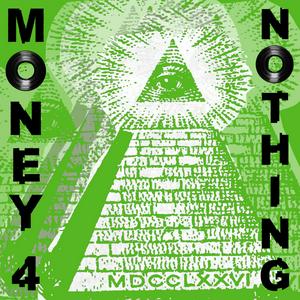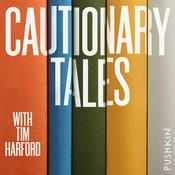112 odcinków
- To ring in the new year, Sam and Saxon pull out both their wayback machine AND their increasingly scuffed-up crystal ball to think through some of the biggest trends from the last year—and to make some predictions about what might be coming in 2026. Was this the year when Spotify finally lost its grip on the PMC intelligentsia? Will Tik Tok’s potential American spinoff release a flood of incriminating music-biz evidence? And what’s up with…rock music out pacing Latin and Country lately? Will anyone write an anthem about work sucking again? Come to hear us tell you how we were right. Stay (and take notes) so you can tell us where we get things wrong.
(and please….excuse the hiss of our radiators. We live in cold places.)
Get full access to Money 4 Nothing at money4nothing.substack.com/subscribe - Well…it’s here folks. From the back roads of the digital countryside to the clubs of London, AI music has finally hit the charts. And the major labels, which had spent much of the last few years promising that they would do everything in their power to protect their artists’ rights and intellectual property and humanity have…signed deals with the major AI companies behind it?
We don’t want to say we told you so but…well…we did. To get a handle on what’s been happening, we consider a bevy of Very Threatening Lawsuits, talk through some recent lawsuit-squashing deals, and unpick the heavy-handed playbook that Universal, Sony, and Warner are running on yet another pack of VC-backed tech bros. Nice generative AI company you got there. Shame if anyone were to accuse it of copyright infringement.
But beyond the revenue streams, cultural influence, and never-to-be-officially-discussed buckets of settlement cash that these tactics promise, the latest developments also reveal hints of what the majors see as the future of AI music: A Walled Garden of user-generated content? A licensing bonanza? A cudgel against Spotify? A slop halo? (Don’t worry—we’ll explain that last one). Come for the rise of the musical replicants and the (potential) fall of the digital squatters. Stay for what all of this might do to a new generation of listeners.
Get full access to Money 4 Nothing at money4nothing.substack.com/subscribe - The Internet, as you know, is a vast and strange place, chock full of subcultures doing all sorts of things. And some of them are…well…curating Vine compilations, putting them onto VHS, carefully crafting distinctive packaging (complete with colored tapes!) and distributing the resulting “art pieces” via Etsy. Just hypothetically speaking, of course. But why would anyone want to do this? Why would anyone want to buy this? And what does the fact that, despite its surface weirdness, the resulting object probably makes a certain amount of aesthetic sense to you…say about our relationship to the media (and the entire digital landscape) in the contemporary moment?
To learn more about this wild, wild world, we talk with Travis Wagner, an assistant professor in the School of Information Sciences at Urbana-Champaign, whose latest research has focused on the “retroconversion” scene in all its tape-dubbing glory. Does 2010s horror deserve VHS-era static? What are the deep urges beneath nostalgia for physical media? Was the ‘90s really the last good time in American culture? Is the ownership of magnetic tape really an act of rebellion against the digital automation of an algorithmically-driven, surveillance capital world? Bust out your Walkman, hit the play button and decide for yourself.
Get full access to Money 4 Nothing at money4nothing.substack.com/subscribe - In the wilds of music streaming lurk eldritch terrors—perhaps few more strange, preposterous, and sanity-shattering than “the Spotify Billions Club,” a constantly updated list of tracks that have well and truly hit the big time. We pierce the post-temporal, post Tik-Tok veil and ask…what in the world is going on here? What are some of these bands? How did they get here? And what can the failure of any one narrative to contain them all tell us about how we understand music?
But this is all just a springboard to try and make sense of the atemporal onslaught of content that characterizes our contemporary moment and the lack of critical engagement with what we are experiencing. This leads us to Kelefa Sanneh’s recent article for the New Yorker which made some major waves by asking “when did music critics get nice?” Beyond poptimism and soft payola, we think the answer lies in how Spotify works and reflects greater trends in popular culture, and how a potential return to a sharper journalistic form will only hold if this is all taken into account. We go long and deep on this one, folks. How else are we going to shake off the cynicism in an attempt to envision a genuinely idealistic vision of what criticism could do.
Money 4 Nothing is a reader-supported publication. To receive new posts and support our work, consider becoming a free or paid subscriber.
Get full access to Money 4 Nothing at money4nothing.substack.com/subscribe - There’s been a conspicuous uptick in the past decade of billionaires buying up media companies. Elon and Twitter. Bezos and the Washington Post. Laurene Powell Jobs and The Atlantic. Forbes, Fortune, LA Times and a slew of other major newspapers are all now controlled by…very rich folks who didn’t make their money in media. But why? We thought print (and honestly, anything NOT a born digital streaming service) was…if not dead, than dying? It’s almost as if these billionaires see more value in these media platforms than the market. It certainly it has nothing to do with the continual ability of these media companies to shape narratives, ideologies and stories reifying our ever increasing death drive towards a modern oligarchy that full aligns with the billionaire class. (Coughs)
And then, the latest nail in the 20th-century-media-coffin: The sale of Paramount (which also includes CBS, MTV, Comedy Central and many others) to Skydance Media. You might be asking yourself “Who?” But don’t worry—Skydance, owned by David Ellison, son of billionaire and Oracle founder Larry Ellison, is the little media shop that could...raise billions via private equity and family funds.
To try and suss out the political, economic, and cultural stakes of this new era, Sam and Saxon set their focus on Paramount and ask: What in the literal f*%k is going on? How is a nepo baby movie studio buying out a major media legacy brand like Paramount and more importantly: Why? And how does this all relate to a Trump quid pro quo, Colbert getting canceled and David Ellison’s horrific vision of a utopic world where a surveillance state keeps the world a more morally virtuous place?
Come for theorizing of major music labels as the plural bipartisan black sheep of billionaire media industries. Stay for our overuse of the word barbarity because Sad Adorno.
Get full access to Money 4 Nothing at money4nothing.substack.com/subscribe
Więcej Historia podcastów
Trendy w podcaście Historia
O Money 4 Nothing
A podcast on music and capitalism. Dropped bi-weekly. money4nothing.substack.com
Strona internetowa podcastuSłuchaj Money 4 Nothing, The Rest Is History i wielu innych podcastów z całego świata dzięki aplikacji radio.pl

Uzyskaj bezpłatną aplikację radio.pl
- Stacje i podcasty do zakładek
- Strumieniuj przez Wi-Fi lub Bluetooth
- Obsługuje Carplay & Android Auto
- Jeszcze więcej funkcjonalności
Uzyskaj bezpłatną aplikację radio.pl
- Stacje i podcasty do zakładek
- Strumieniuj przez Wi-Fi lub Bluetooth
- Obsługuje Carplay & Android Auto
- Jeszcze więcej funkcjonalności


Money 4 Nothing
Zeskanuj kod,
pobierz aplikację,
zacznij słuchać.
pobierz aplikację,
zacznij słuchać.








































